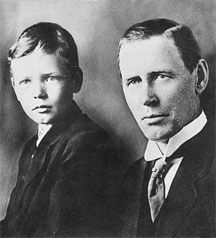Charles Lindbergh
Charles Augustus Lindbergh (February 4, 1902 – August 26, 1974) was an American aviator, military officer, author, inventor, and environmental activist. He rose to international fame in 1927 for making the first non-stop transatlantic flight from New York City to Paris in the single-engine monoplane, Spirit of St. Louis. This historic flight not only won him the prestigious Orteig Prize but also marked a significant milestone in the field of aviation, demonstrating the potential for long-distance air travel.
Early Life[edit | edit source]
Charles Lindbergh was born in Detroit, Michigan, to Charles August Lindbergh, Sr., a lawyer and later a U.S. Congressman, and Evangeline Lodge Land Lindbergh, a chemistry teacher. The family soon moved to Little Falls, Minnesota, where Lindbergh spent much of his childhood. He developed an early interest in mechanics and aviation, attending the University of Wisconsin to study engineering but dropped out to pursue a career in aviation.
Aviation Career[edit | edit source]
Lindbergh's aviation career began in earnest when he started performing daredevil stunts and barnstorming across the United States. He enlisted in the United States Army Air Service in 1924, where he graduated as the top pilot in his class. Lindbergh then worked as an airmail pilot, flying the route between St. Louis and Chicago. It was during this time that he conceived the idea of making a non-stop flight across the Atlantic Ocean.
The Spirit of St. Louis[edit | edit source]
In pursuit of the Orteig Prize, Lindbergh secured financial backing from several businessmen in St. Louis to build the Spirit of St. Louis, a custom airplane designed for the long flight. On May 20, 1927, Lindbergh took off from Roosevelt Field in New York and landed at Le Bourget Field in Paris approximately 33.5 hours later, covering a distance of nearly 3,600 miles. His successful solo flight made him an instant worldwide celebrity and earned him numerous awards, including the U.S. Medal of Honor.
Later Life and Legacy[edit | edit source]
Following his historic flight, Lindbergh used his fame to promote aviation and various philanthropic causes. He was involved in the development of the first artificial heart with French surgeon Alexis Carrel and was an early environmental activist, advocating for the conservation of species and natural habitats.
Lindbergh's life was also marked by tragedy, most notably the kidnapping and murder of his first child, Charles Jr., in 1932, an event that led to what was called "the trial of the century." In later years, Lindbergh became a controversial figure due to his non-interventionist stance before the United States entered World War II and his involvement in the America First Committee.
Despite these controversies, Lindbergh's contributions to aviation and his pioneering spirit have left a lasting legacy. He passed away on August 26, 1974, in Maui, Hawaii, but remains a significant figure in the history of flight and 20th-century America.
See Also[edit | edit source]
Search WikiMD
Ad.Tired of being Overweight? Try W8MD's NYC physician weight loss.
Semaglutide (Ozempic / Wegovy and Tirzepatide (Mounjaro / Zepbound) available. Call 718 946 5500.
Advertise on WikiMD
|
WikiMD's Wellness Encyclopedia |
| Let Food Be Thy Medicine Medicine Thy Food - Hippocrates |
Translate this page: - East Asian
中文,
日本,
한국어,
South Asian
हिन्दी,
தமிழ்,
తెలుగు,
Urdu,
ಕನ್ನಡ,
Southeast Asian
Indonesian,
Vietnamese,
Thai,
မြန်မာဘာသာ,
বাংলা
European
español,
Deutsch,
français,
Greek,
português do Brasil,
polski,
română,
русский,
Nederlands,
norsk,
svenska,
suomi,
Italian
Middle Eastern & African
عربى,
Turkish,
Persian,
Hebrew,
Afrikaans,
isiZulu,
Kiswahili,
Other
Bulgarian,
Hungarian,
Czech,
Swedish,
മലയാളം,
मराठी,
ਪੰਜਾਬੀ,
ગુજરાતી,
Portuguese,
Ukrainian
Medical Disclaimer: WikiMD is not a substitute for professional medical advice. The information on WikiMD is provided as an information resource only, may be incorrect, outdated or misleading, and is not to be used or relied on for any diagnostic or treatment purposes. Please consult your health care provider before making any healthcare decisions or for guidance about a specific medical condition. WikiMD expressly disclaims responsibility, and shall have no liability, for any damages, loss, injury, or liability whatsoever suffered as a result of your reliance on the information contained in this site. By visiting this site you agree to the foregoing terms and conditions, which may from time to time be changed or supplemented by WikiMD. If you do not agree to the foregoing terms and conditions, you should not enter or use this site. See full disclaimer.
Credits:Most images are courtesy of Wikimedia commons, and templates, categories Wikipedia, licensed under CC BY SA or similar.
Contributors: Prab R. Tumpati, MD





